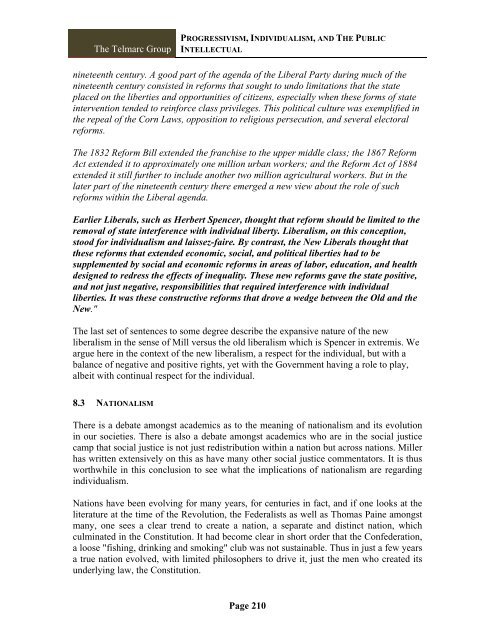progressivism, individualism, and the public ... - Telmarc Group
progressivism, individualism, and the public ... - Telmarc Group
progressivism, individualism, and the public ... - Telmarc Group
You also want an ePaper? Increase the reach of your titles
YUMPU automatically turns print PDFs into web optimized ePapers that Google loves.
The <strong>Telmarc</strong> <strong>Group</strong><br />
PROGRESSIVISM, INDIVIDUALISM, AND THE PUBLIC<br />
INTELLECTUAL<br />
nineteenth century. A good part of <strong>the</strong> agenda of <strong>the</strong> Liberal Party during much of <strong>the</strong><br />
nineteenth century consisted in reforms that sought to undo limitations that <strong>the</strong> state<br />
placed on <strong>the</strong> liberties <strong>and</strong> opportunities of citizens, especially when <strong>the</strong>se forms of state<br />
intervention tended to reinforce class privileges. This political culture was exemplified in<br />
<strong>the</strong> repeal of <strong>the</strong> Corn Laws, opposition to religious persecution, <strong>and</strong> several electoral<br />
reforms.<br />
The 1832 Reform Bill extended <strong>the</strong> franchise to <strong>the</strong> upper middle class; <strong>the</strong> 1867 Reform<br />
Act extended it to approximately one million urban workers; <strong>and</strong> <strong>the</strong> Reform Act of 1884<br />
extended it still fur<strong>the</strong>r to include ano<strong>the</strong>r two million agricultural workers. But in <strong>the</strong><br />
later part of <strong>the</strong> nineteenth century <strong>the</strong>re emerged a new view about <strong>the</strong> role of such<br />
reforms within <strong>the</strong> Liberal agenda.<br />
Earlier Liberals, such as Herbert Spencer, thought that reform should be limited to <strong>the</strong><br />
removal of state interference with individual liberty. Liberalism, on this conception,<br />
stood for <strong>individualism</strong> <strong>and</strong> laissez-faire. By contrast, <strong>the</strong> New Liberals thought that<br />
<strong>the</strong>se reforms that extended economic, social, <strong>and</strong> political liberties had to be<br />
supplemented by social <strong>and</strong> economic reforms in areas of labor, education, <strong>and</strong> health<br />
designed to redress <strong>the</strong> effects of inequality. These new reforms gave <strong>the</strong> state positive,<br />
<strong>and</strong> not just negative, responsibilities that required interference with individual<br />
liberties. It was <strong>the</strong>se constructive reforms that drove a wedge between <strong>the</strong> Old <strong>and</strong> <strong>the</strong><br />
New."<br />
The last set of sentences to some degree describe <strong>the</strong> expansive nature of <strong>the</strong> new<br />
liberalism in <strong>the</strong> sense of Mill versus <strong>the</strong> old liberalism which is Spencer in extremis. We<br />
argue here in <strong>the</strong> context of <strong>the</strong> new liberalism, a respect for <strong>the</strong> individual, but with a<br />
balance of negative <strong>and</strong> positive rights, yet with <strong>the</strong> Government having a role to play,<br />
albeit with continual respect for <strong>the</strong> individual.<br />
8.3 NATIONALISM<br />
There is a debate amongst academics as to <strong>the</strong> meaning of nationalism <strong>and</strong> its evolution<br />
in our societies. There is also a debate amongst academics who are in <strong>the</strong> social justice<br />
camp that social justice is not just redistribution within a nation but across nations. Miller<br />
has written extensively on this as have many o<strong>the</strong>r social justice commentators. It is thus<br />
worthwhile in this conclusion to see what <strong>the</strong> implications of nationalism are regarding<br />
<strong>individualism</strong>.<br />
Nations have been evolving for many years, for centuries in fact, <strong>and</strong> if one looks at <strong>the</strong><br />
literature at <strong>the</strong> time of <strong>the</strong> Revolution, <strong>the</strong> Federalists as well as Thomas Paine amongst<br />
many, one sees a clear trend to create a nation, a separate <strong>and</strong> distinct nation, which<br />
culminated in <strong>the</strong> Constitution. It had become clear in short order that <strong>the</strong> Confederation,<br />
a loose "fishing, drinking <strong>and</strong> smoking" club was not sustainable. Thus in just a few years<br />
a true nation evolved, with limited philosophers to drive it, just <strong>the</strong> men who created its<br />
underlying law, <strong>the</strong> Constitution.<br />
Page 210












